|
|
|
Sort Order |
|
|
|
Items / Page
|
|
|
|
|
|
|
| Srl | Item |
| 1 |
ID:
112820
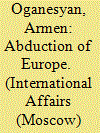

|
|
|
|
|
| Publication |
2012.
|
| Summary/Abstract |
WE ARE WATCHING the "abduction of Europe": the European dream of many generations of great European politicians is melting away. It was immediately after the war that Robert Schuman, Jean Monnet, Winston Churchill, Charles de Gaulle, Konrad Adenauer, Paul-Henri Spaak and many others laid the ideological foundation of united Europe. In 1962, Harold Macmillan disappointed his audience by saying to the EEC prime ministers that his country was determined to integrate into Europe. The British primer was convinced that his country could look forward to economic growth only as part of a big continental bloc. Today, the British press has dismissed this as a superficial and short-sighted approach which nevertheless was accepted by the larger part of the establishment and which cost dearly to the nation. The Brits, however, are often pushed aside as an insular nation. Le Monde of France betrays its concern by asking "Will Europe repeat the history of the USSR?" It admits, with a great deal of bitterness, that the integration institutes and Euro-bureaucracy which have grown out of proportion "are treated in Europe at best with indifference or at worst are totally rejected."
|
|
|
|
|
|
|
|
|
|
|
|
|
|
|
|
| 2 |
ID:
112822
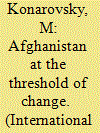

|
|
|
|
|
| Publication |
2012.
|
| Summary/Abstract |
ON DECEMBER 5, 2011, Bonn hosted a large-scale International Afghanistan Conference under the slogan "Afghanistan and the International Community: From Transition to the Transformation Decade" attended by high representatives of about 100 countries and international organizations, in short, practically the entire range of the world community. The conference met to look at ten years of post-Taliban development and reconfirm a broad international consensus on the Roadmap of the country's development after the draw-down of American and NATO contingents launched in the summer of 2011 and expected to be completed in 2014.
|
|
|
|
|
|
|
|
|
|
|
|
|
|
|
|
| 3 |
ID:
112812
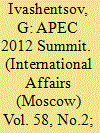

|
|
|
|
|
| Publication |
2012.
|
| Summary/Abstract |
THE SUMMIT of the Asia-Pacific Economic Cooperation Forum (APEC) in Vladivostok promises to be the biggest international event in Russia in 2012.
This is no surprise. Today, the center of international political and economic life is shifting towards the Asia-Pacific region. APEC, the region's main economic forum, includes the world's most powerful economies: USA, China, Japan, and almost half of G-20 member countries, which account for the greater part of global production, including high technologies. The USA assigns great importance to this region in its global forecasts. The Asia-Pacific superpower China is playing a growing geopolitical role.
|
|
|
|
|
|
|
|
|
|
|
|
|
|
|
|
| 4 |
ID:
112808
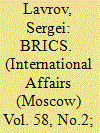

|
|
|
|
|
| Publication |
2012.
|
| Summary/Abstract |
THE ESTABLISHMENT OF BRICS initiated by the President of the Russian Federation Vladimir Putin in 2006 has been one of the most significant geopolitical events since the beginning of the new century. The group has shortly become a powerful factor influencing world politics and economy.
|
|
|
|
|
|
|
|
|
|
|
|
|
|
|
|
| 5 |
ID:
112813
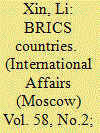

|
|
|
|
|
| Publication |
2012.
|
| Summary/Abstract |
THE MAN WHO COINED the acronym BRIC probably did not even imagine that it would later be filled with real content and would acquire viability. Indeed, the nations that became part of this association are located at the most different points of the planet - in Asia, Africa, Europe, and Latin America. Nevertheless, the development of the economic structures of the BRICS countries has brought about a diversification of the world economy and global market, previously focused mainly on the U.S. and Western countries. In the process of the reform of global economic governance, these countries stand on similar ground; they strengthen coordination of actions and cooperate with each other. These countries are at similar stages of development and tackle approximately the same tasks: economic growth, internal stability and social development. Their advantage lies in the fact that their economies are complementary, which provides a broad field for cooperation within the scope of one organization and with the rest of the world. It is safe to say that the BRICS countries are active supporters and practitioners of global partnership for development and a bridge for North-South dialogue and cooperation
|
|
|
|
|
|
|
|
|
|
|
|
|
|
|
|
| 6 |
ID:
112818


|
|
|
|
|
| Publication |
2012.
|
| Summary/Abstract |
THE YEAR 2011 will be remembered as a period of unprecedented uncertainty in the history of modern Europe. On the one hand, contrary to widespread apocalyptic expectations, the EU did not crumble and the amplitude of the oscillations in the value of the relatively young European currency did stay within tolerable limits. On the other, it is clear that the integrated Europe's worst crash tests are still ahead and that the difficulties confronting the EU are a lot more systemic than circumstantial ...
|
|
|
|
|
|
|
|
|
|
|
|
|
|
|
|
| 7 |
ID:
112819
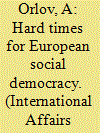

|
|
|
|
|
| Publication |
2012.
|
| Summary/Abstract |
THE 20TH CENTURY is commonly believed to be the golden age of Social Democracy even though the number of enthusiastic supporters is balanced out by the number of no less enthusiastic opponents of this idea. It is obvious, however, that the ideology and its vehicle - the socialist and social democratic parties - have figured prominently on the ideological and political scene of the contemporary world.
|
|
|
|
|
|
|
|
|
|
|
|
|
|
|
|
| 8 |
ID:
112817
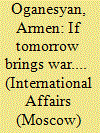

|
|
|
|
|
| Publication |
2012.
|
| Summary/Abstract |
THE LAW ALLOWING the U.S. President to severely limit Iran's oil exports has sparked a flurry of comments and a strong reaction from Iran. But then the anti-Iranian rhetoric abated and conciliatory notes were heard on both sides. This of course does not change the essence of the matter, nor does it remove the main question from the global agenda: Will the U.S. go to war with Iran and if so, when?
|
|
|
|
|
|
|
|
|
|
|
|
|
|
|
|
| 9 |
ID:
112810


|
|
|
|
|
| Publication |
2012.
|
| Summary/Abstract |
Sergei Ryabkov: As for the retrospective, I believe that there are not very many regions in the world, if any, far away from our borders where there would be so many people sympathizing with Russia. People who either have studied in our country or are in some way or other linked to our country. People sharing the ideals that we as a country upheld in the past, those who saw Russia (USSR) as a symbol of social justice and movement toward a better future. Generally speaking, that is a unique set of circumstances that, in my opinion, still have a positive impact on Russia's relations with the Latin American region and the prospects for our ties.
|
|
|
|
|
|
|
|
|
|
|
|
|
|
|
|
| 10 |
ID:
112814
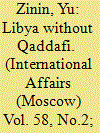

|
|
|
|
|
| Publication |
2012.
|
| Summary/Abstract |
IN LIBYA, the supreme power in October 2011 passed into the hands of the National Transitional Council (NTC), which declared the country's liberation from Muammar Qaddafi's dictatorship.
With his removal the authoritarian model he called Jamahiriya ("state of the masses") lost its top leadership. The social and political system, crafted specifically for the leader, had ensured the governability and development of a vast country with a small population and riven by tribal loyalties as a single state for 42 years.
In autumn 2011, the NTC published a Roadmap for Democracy in Libya with a 20-month countdown to an election for a Constituent Assembly to adopt a new Constitution and other laws. After the Assembly's election, NTC is to be dissolved.
|
|
|
|
|
|
|
|
|
|
|
|
|
|
|
|
| 11 |
ID:
112823
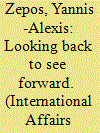

|
|
|
|
|
| Publication |
2012.
|
| Summary/Abstract |
ONE ASPECT OF INTERNATIONAL POLITICS that seems fraught with dialectical tensions at every turn is the effort to give form and substance to the apparent belief of NATO member states that in the face of issues of a global nature the Alliance has a distinctly functional nature in a dense transatlantic institutional environment. To the extent that in the beginning of the 21st century the likelihood of conventional war between major powers is lower than at any time in modern history, NATO's existential basis was severely challenged.
|
|
|
|
|
|
|
|
|
|
|
|
|
|
|
|
| 12 |
ID:
112826


|
|
|
|
|
| Publication |
2012.
|
| Summary/Abstract |
International Affairs: The top audit bodies of the Russian Federation and the Socialist Republic of Vietnam have audited two Russian-Vietnamese oil exploration and production companies - Vietsovpetro based in Vietnam and Rusvietpetro based in Russia. Their findings were discussed in Hanoi on December 5, 2011 by delegates of the Russian Audit Chamber and Vietnam's State Audit who signed a joint statement. Aleksei Alekseevich, you led the Russian team. Could you describe the importance of the two companies for economic cooperation between Russia and Vietnam?
A. Kuz'mitsky: The intergovernmental agreement on founding the joint company, Vietsovpetro, for geological exploration and production of oil and gas on the continental shelf in the south of Vietnam was signed back in 1981. Commercial production began there in 1986. Vietsovpetro produces the greater proportion of the country's stock-tank oil. Cooperation under the Vietsovpetro umbrella was extended under the agreement signed on July 16, 1991, and it was further extended until the end of 2030 under the agreement that went into effect on January 1, 2011. The latter accord set the Russian participation in the project at 49% and the Vietnamese participation at 51% against the earlier fifty-fifty arrangement. Even so the project is exceptionally profitable to Russia. The joint audit by the Russian Audit Chamber and the State Audit of Vietnam confirmed the earlier assessment of Vietsovpetro as a highly efficient company with low production costs.
|
|
|
|
|
|
|
|
|
|
|
|
|
|
|
|
| 13 |
ID:
112821


|
|
|
|
|
| Publication |
2012.
|
| Summary/Abstract |
TODAY, IT HAS BECOME abundantly clear that the world has changed its development paradigm. While in the 1960s-1970s and even early in the 1990s it looked as if the world was moving somewhere, today it seems that the world elite do not know what is going on. The living standards in Western Europe and North America have stopped rising; the global economic crisis shows no signs of folding up - it is unfolding.
|
|
|
|
|
|
|
|
|
|
|
|
|
|
|
|
| 14 |
ID:
112815


|
|
|
|
|
| Publication |
2012.
|
| Summary/Abstract |
THE YEAR 2012 MARKS the ten-year anniversary of UN General Assembly resolution 57/60 and the UN Secretary-General's report on disarmament and non-proliferation education.1 At the very beginning of the 21st century, it became clear that a new wave of interest in atomic energy, dubbed the "nuclear renaissance," is engulfing an ever greater number of states. Nuclear technologies and materials have not yet become an object of common everyday use, but access to them by new countries, companies and people is increasing. Accordingly, the risks are growing of their falling into "unclean hands." Throughout the world, people know that one cannot walk across the road on a red light, every person traveling in a motor vehicle must wear a seat belt, and on crowded public transport you need to watch your wallet. Society develops rules for behavior that are easy to understand and taught to us since early childhood, helpful in protecting life and making it more comfortable.
|
|
|
|
|
|
|
|
|
|
|
|
|
|
|
|
| 15 |
ID:
112811
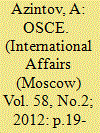

|
|
|
|
|
| Publication |
2012.
|
| Summary/Abstract |
THE OSCE IS STILL at the crossroads, continuing to lose its relevance. The past year was not an exception: the results of the ministerial meeting in Vilnius in December 2011 only confirmed that the critical mass in the organization's activity is increasing while no progress was made toward the implementation of the task of building a "security community," which was set at the OSCE Astana Summit in 2010. That is another setback in the efforts to restore the OSCE's original function as one of the leading forums for equal and mutually beneficial dialogue, collective development of consensus based decisions on key European security issues, not decisions dictated by group or bloc interests. Despite the efforts that are made the organization unfortunately is not moving toward a unifying agenda. The OSCE is still affected by the lack of balance in its work on the substance and the geographic base of the issues under discussion. Some of its key partners are opposed to a serious review and reform of the organization, the consolidation of its legal base, and are not ready for the much needed modernization of this versatile platform, taking into account the changing realities.
|
|
|
|
|
|
|
|
|
|
|
|
|
|
|
|
| 16 |
ID:
112809
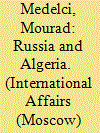

|
|
|
|
|
| Publication |
2012.
|
| Summary/Abstract |
Let me first of all express my gratitude to you for the honor you have granted me to address this distinguished forum of the "International Affairs" magazine. I present our appreciation for the quality and depth of your research and analysis so informative and relevant in a rapidly changing and sometimes uncertain international context
|
|
|
|
|
|
|
|
|
|
|
|
|
|
|
|
| 17 |
ID:
112816


|
|
|
|
|
| Publication |
2012.
|
| Summary/Abstract |
WHEN THE RUSSIA-EU SUMMIT in Moscow on May 10, 2005 endorsed the road maps for the Four Common Spaces (the Common Economic Space; Common Space of Freedom, Security and Justice; the Common Space of External Security; and the Common Space of Research, Education and Culture), this gave rise to many hopes and expectations - politicians, experts, and journalists spoke about a breakthrough in relations between Russia and a united Europe and tended to assert that the sides had finally overcome their fundamental differences, surmounted bureaucratic obstacles and now stood ready to ascend to a qualitatively new level of cooperation on a wide range of issues. Optimistic scenarios were built as to how the abolition of the visa regime would unfold, how the harmonization of legislation of the parties would proceed and what institutional forms the declared "strategic partnership between the European Union and Russia" could take.
|
|
|
|
|
|
|
|
|
|
|
|
|
|
|
|
| 18 |
ID:
112825
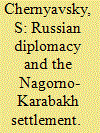

|
|
|
|
|
| Publication |
2012.
|
| Summary/Abstract |
THE CONFLICT SURROUNDING Nagorno-Karabakh and the adventurous acts of Georgia's leadership ratchet up tensions in the North Caucasus thus hampering war on terrorism and holding up economic development all over the Caucasus. This makes peaceful settlement of territorial and ethno-political problems of the former Soviet republics in Transcaucasia one of the important priorities for Russian diplomacy.
Attempts are being made as before in this region, which is home to a unique community of tens of millions of people, to divide it into spheres of influence. In the meantime, the common responsibility and overriding task of the states in the region (including Russia) consist in getting the situation in the Caucasus under close joint control, extinguishing the conflicts and dealing with their aftereffects. The road to prosperity of its peoples lies through development and broader cooperation, reliance on their collective experience in political, economic, scientific and technological interaction, the common cultural legacy and the common history of Russia and of other people of the Caucasus.
|
|
|
|
|
|
|
|
|
|
|
|
|
|
|
|
| 19 |
ID:
112824


|
|
|
|
|
| Publication |
2012.
|
| Summary/Abstract |
OVER THE PAST SEVERAL DECADES, the situation in the Arctic has altered greatly. For a long time, it had remained an insufficiently studied, poorly developed, remote region with a harsh climate where the situation was of not so much concern to the international community. It was proposed that the Arctic be either regarded as the common property of mankind or be placed under international administration after its status was defined at an international conference. Another idea was to divide the Arctic into a system of sectors belonging to the Arctic countries with direct outlet to the North Pole. In the 19th century, however, some Arctic states actively sought to establish their sovereignty over the Arctic islands and water areas unilaterally.
|
|
|
|
|
|
|
|
|
|
|
|
|
|
|
|
|
|
|
|
|